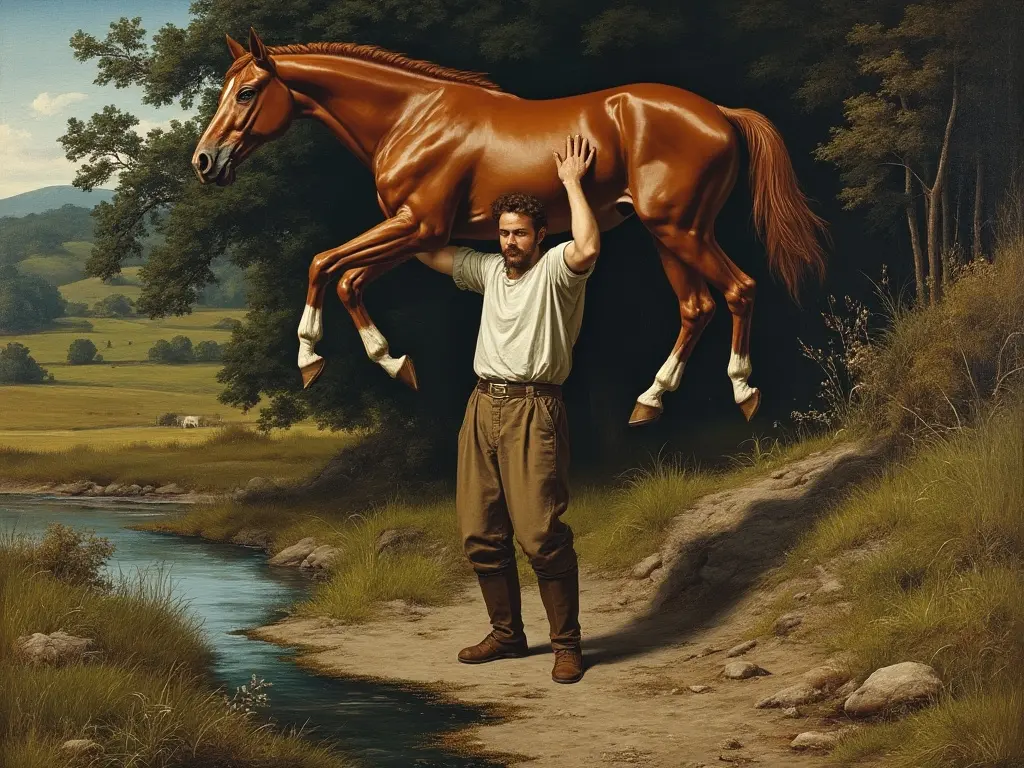
Today’s story is By Lyman Bryson. It is a strange little tale of a clumsy carthorse and a very, very strong ditch digger.
“For why should you be tired?” demanded his wife, splashing her arms viciously in the suds as she finished the day’s rinsing. “You’ve nothing to do but shovel dirt all day and rest when your boss ain’t looking.”
“Gwan, I’m a hard-working man,” said Kallaher. “And, what’s more, I can kick about it whenever I want to without any remarks from yourself. I’m tired. When’s supper?”
“Supper is any time when I can get my arms dry and get a good breath.” Mrs. Kallaher began belligerently to get his supper.
Kallaher stretched his short legs out in front of him and leaned back in his chair. “It was a hard day,” he said gently. “As if it wasn’t enough to have me breaking my back with the shovel and all, a fool drove his horse too close to the ditch, and the dumb beast fell in on top of me.”
“That’s likely—now, ain’t it?—and you being here to tell about it!”
“Believe it or not, it happened.” Kallaher folded his hands across the place where he didn’t wear a belt and sighed. “But I put him out again and went on with my work without taking a rest or nothing.”
Mrs. Kallaher might have tried again to express her incredulity, but just then old Mother Coogan, next-door neighbour, thrust a red excited face through the kitchen door.
“Mary Kallaher, is your man home?”
“Why shouldn’t he be?”
Mrs. Coogan entered and stood, one hand clutching a newspaper, the other pointing dramatically at Kallaher. “It may be so, but he don’t look it,” she said.
Before they could question her she began reading from the paper: “Mike Kallaher, a ditch digger on the new Twelfth Street sewer, is a small man but a mighty. A horse, driven too near the ditch to-day, fell in. ‘Begorra,’ said Mike, ‘can’t a man work in peace?’ He laid down his shovel, spat on his hands, and heaved the horse back into the street. The foreman thought he had been hurt when the horse fell in, but he wasn’t, and he was not in the least bothered by having to throw him back out again. He went back to his digging.”
“Let me see that paper.” Kallaher rose and took it from her hand. Slowly he went over the story—which the reporter who wrote it had thought exceeding clever. “Yeh,” he said finally, “that’s me, all right.”
Mrs. Coogan looked upon him with respect. “I never thought much of you before, Mike Kallaher, but you’re the only man I know that could pick up a horse.” She turned to his wife. “It’s no wonder you’re a meek woman, Mary, but you ought to be proud of a man like that, sure.”
“Are you coming on with supper now?” asked Kallaher in a mighty voice of the speechless Mrs. Kallaher. “Be quick now, or I’ll give you what’s needing.”
Never before had he dared make a threat as if he meant it. His wife was struck with sudden awe. She gasped and hurried silently with the setting on of supper. She trembled and dropped a dish.
“You poor clumsy dub!” roared her husband, towering to the height of five-feet-two. “Are you so weak you can’t hold a pot, now?”
“Excuse me, Michael,” she murmured. “Excuse me, man. I was excited.”
Mrs. Coogan saw with approval that Kallaher was bullying his wife, and went down the street to tell the neighbourhood.
In Mike Kallaher’s kitchen—for it had suddenly become his own, after belonging for fifteen years to his wife—a poor, meek, unhappy-looking Irishwoman was obeying orders. She jumped when he yelled at her, which he did every two minutes to see her jump, begged his pardon, brought his pipe, and looked on in silence when he deliberately knocked out the ashes on the newly scrubbed floor. A man who could throw a horse out of a ditch would stop at nothing.
As the new monarch sat in his chair looking contemptuously away from his slave, who was tentatively watching him, there was a knock at the door. Mike’s chest had begun to get tired from being swelled out so far, and he let out his breath with a sigh.
A suave young man was admitted. After ascertaining that Mike Kallaher really lived in this place he asked Mike how he was feeling.
“Good,” was the truculent answer.
“No injuries from your little adventure this afternoon?”
“Injured, is it? Not a bit—not a bit.”
“I’m glad to hear that. I’m assistant manager of the Burke Construction Company. We heard one of our horses fell on you to-day, so I came down to help out if you were hurt. We thought we could afford to pay a few hundred dollars on doctor bills.” The young man smiled pleasantly. “But since you’re not hurt and are so willing to admit it, we won’t have that pleasure. Good-bye.” He got up and went.
Kallaher had forgotten to swell out his chest again. He sat drooping in his chair. His wife was no longer tentative.
“Horse heaver, is it?” She advanced, menacing. “Horse heaver? You poor mick! There goes your chance to be a cripple for life and die rich.”
She pulled his face up by the front hair and slapped him like a mother.
“Horse heaver, is it? Take that, now!”
And Kallaher took it.